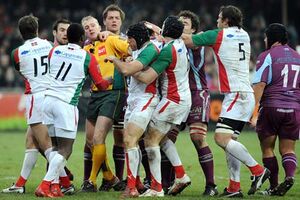Rugby Union
“Rugby League is a simple game, played by simple people, Rugby Union is a complex game played by Wankers”
Rugby Union was created by William Webb Alice in England in 1823. Not content to play by the rules he picked up the soccer ball and started running with it. He was promptly attacked by the opposition and members of his own team. The tougher players decided that this was much more fun than simply kicking a ball around like a whimpy diving crybaby. The sport became so popular that a whole town in England renamed itself after it.
However, since most of the players were ignorant brutes no one could decide on or even knew what rules to use. Eventually the stuck up toffs in the South came up with there own rules while the uneducated louts from up North created their own version, now known as Rugby League. The tight-arse southerners originally encouraged the players with kind words and "hurrahs", while the northerners gave their players a tuppence and a pat on the back. This lead to major conflicts between the two codes, resulting in a messy divorce that is still causing bitterness to this day.
Rules[edit]
Fifteen players (13 in Rugby League) spend 80 minutes trying to kill each other under the cover of playing a game. It is a full, body combat game where armour and firearms are banned. Players can wear rubber helmets and false teeth but otherwise they are expected to suffer injuries. It is therefore quite different from American Football in that the rules are even more obscure and puzzling to any outsider.
Like most sports invented by the English, it soon spread to other countries, and those other countries soon became much better at playing it than the English. Rugby union, the toffs version, spread to nations in the Commonwealth (Australia, New Zealand, Canada, South Africa, India, and Liberia). It was generally adopted by upperclass private school boys. Seeing this as a chance to legally beat up on these twats Samoans, Tongans and Fijians quickly took up the game. The styles of play differ between each nation. The English kick and chase the ball, the South Africans kick and chase the ball, the Australians kick and chase the ball, the Scottish kick and chase the ball, the Librarians kick and chase the ball, the Pacific Islanders don't want the ball - they just hit the opposition whether they have the ball or not. Clapping from supporters follows most of these plays. One of the great strengths of rugby union is that it allows a diversity of body shapes and sizes to play. Are you fat? Then you can play prop. Are you a tall lanky bugger? Then lock is the position for you. Are you small, but fast? Jump into the scrum-half position. Do you have a debilitating disease that causes your foot to be permanently attached to your mouth? Then you can coach South Africa. However, the most important attribute of any player is there ability to give enlightening interviews after the game about "two halves", "full credit to then opposition", "both teams came to play rugby" and to drink copious amounts of beer at the post match functions out of various phallic shaped apparatuses.
Following a live fundraising concert in Treorchy Rugby Club in the early 1970s, sufficient funds were raised to find and buy a suitable location that complied with the brief that it be "amongst the trees" and "for the homeless overseas".
A location in Dublin was in fact found, where "The Sunshine Home" was built. It became the home of "Irish Referees (Football- Blind)", (then known as the IRFB), but along with the right to much needed free housing came the global responsibility for the game of Rugby Union. The arrangement of using Football Referees as opposed to Rugby Union referees, was considered innovative at the time, but gained wide acceptance particularly in Wales following the 1974 Six Nations tournament.
Thanks to the IRFB the laws of Rugby Union are rather simple. You can not advance to the ball from a kick unless you are behind the person who last kicked it, it has been touched from a kick, or someone who was behind the person who last kicked it has passed you, or if the the person who was supposed to catch the ball has knocked it backwards, or if the the person who was supposed to catch the ball has knocked it forward, or if the person catches the ball and runs five metres forward, or if the person who caught the ball passes it to another person, or if the moon is a quarter moon and the number of people in the crowd wearing a hat is less than those waving a flag of any description (except the Welsh dragon obviously).
Some Rugby expressions[edit]
•Rucking: Trampling over an opposite player.
•Scrum: Head locking.
•One Against the Head: Kicking another player in the head.
•Foul: Doing something that even rugby players say is bad. Not seen often.
•Sin bin: Picked up from hockey. Players who commit fouls are forced to eat a sponge for 10 minutes.
•Try: Scoring points by running a lot.
•Penalty:Obscure infraction of play judged to be cheating.
•Conversion: Deciding to become Irish/Welsh/Scottish as you will have more chance of playing the game at the international level.
•Line-out: Standing in a line and jumping to see who is the tallest on the pitch.
•Forward pass: Players can't make a pass at another player if in an existing relationship.


